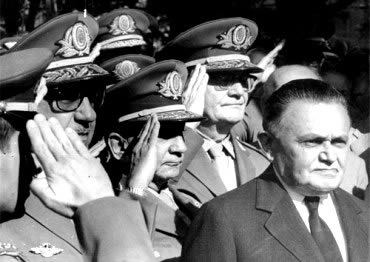In the months following the coup, the Brazilian generals issued an institutional act, which expanded their executive power, and arrested left-wing activists, members of the Brazilian Communist Party, and supporters of Goulart. Castelo Branco issued Institutional Act No. 2, which abolished all existing political parties and created two parties: ARENA and MDB. With other such institutional acts, the military regime offered a façade of democratic rule and constitutionality; however, they continually issued new decrees, suspended citizens’ political rights, censored the press, and changed electoral law.
Despite the veneer of legality, soon enough, opposition began to criticize the military dictatorship ruling Brazil. Politicized youth in the United States, who were already becoming disillusioned with U.S. foreign policy in Vietnam, also began questioning U.S. government policies toward Latin America in the 1960s. A loose network of individuals, groups, collectives, and projects emerged to challenge Washington’s policies in Cuba, the Dominican Republic, and Brazil.
On April 28, 1965, the United States invaded the Dominican Republic to prevent another Cuba. Public opinion remained in favor of the invasion, but scholars, missionaries, and volunteers who had been stationed in Latin America opposed Johnson’s policies. Click here to read a statement by specialists to President Johnson about the Dominican Republic. Brady Tyson, a Methodist missionary, was someone who was deeply affected by the invasion of the Dominican Republic.
Two days after Castelo Branco decreed Institutional Act No. 2 in October 1965, Senator Wayne Morse, at first praising the military takeover, quickly denounced the regime — and U.S. support for it — in a press release. He and Senator Albert Gore, Sr. of Tennessee raised numerous questions about U.S. involvement in the 1964 coup.

